Alzheimer’s disease is cruel and progressive. In the beginning stages, it brings disorientation and confusion: as the disease progresses, sufferers forget the names of family members and lose their grip on reality, eventually needing round-the-clock care. It is terrifying for sufferers, and heartbreaking for their friends and family members.
While there is currently no cure for the disease, there are products on the market which make things easier.
In the early stages of Alzheimer’s, patients often struggle with timekeeping. Large clocks and electronic calendars can help them to keep track of the days, and timed pillboxes prevent dangerous mix-ups with medicine. Mind games, such as card games or electronic IQ trainers, help to keep the brain sharp for as long as possible.
People in the middle stages of the disease will often enjoy listening to music or watching films from their early years. By this point, they may struggle with complex games, but jigsaws or shape-sorting games are still accessible.
In the late stages of Alzheimer’s, people often enjoy having something to do with their hands. Stuffed animals are popular, as are toys which can be squeezed or twisted. By this stage people with Alzheimer’s have lost the ability to follow complex plots, but they can still enjoy soothing DVDs (such as nature documentaries) and listen to music.
1. One button radio
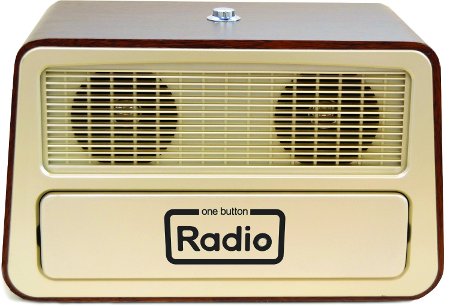
People with Alzheimer’s often find music a great comfort, even in the very late stages. This radio has just one button, on/off, to avoid the confusion that comes with dozens of different buttons.
Caregivers can lift off the front panel to set the radio to the preferred station and volume, then screw it back on to hide the extra buttons.
This radio is large – it might seem too large, if you’re used to tiny modern radios the size of a paperback. But the hefty size means it’s easy to find and hard to forget about, and it won’t get knocked over and broken.
2. Digital clock
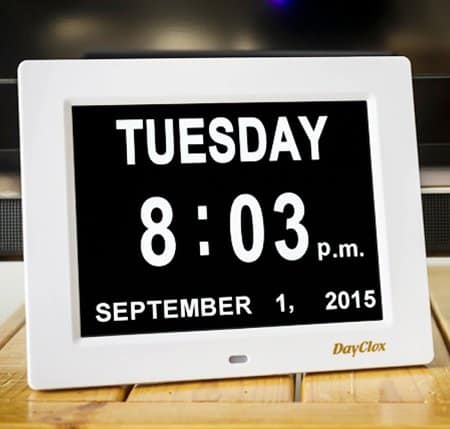
There are plenty of easy-to-read digital clocks on the market, but this one is specifically designed for people with Alzheimer’s. It shows the exact time, the day of the week, and the date, all written out in full since abbreviations can be confusing for people with memory loss.
The plug-in clock has a large screen with high-resolution text that can be read even in the dark. It looks just like other clocks on the market, and doesn’t feature any words like “Alzheimer’s” or “memory loss” anywhere, so it’s a great gift for someone in the early stages of the disease who needs a bit of help but doesn’t want to feel self-conscious about it.
In the later stages of Alzheimer’s, people often get confused by telling the time. Another clock on the market shows only the day of the week and the cycle of the day (morning, afternoon, evening, or night.
A caregiver needs to set the clock up, but after that it runs with no interference. It’s also possible to set what time each cycle of the day begins: so, for example, if you know Grandma has always been an early riser, you can set “morning” to begin at 5.30am rather than the pre-programmed 7am.
3. Lap pad
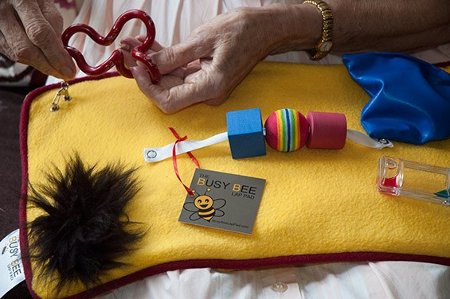
People in the late stages of Alzheimer’s usually like having something to fidget with, and playing with your hands can also help to boost fine motor skills. This lap pad has five different items for tactile stimulation – a bean bag, a puff of lambswool, a tangle puzzle, wooden beads, and a liquid motion game.
The underside of the lap pad is weighted with 5lbs of soft gel padding: weighted pads like this reduce stress and the soft gel is comfortable on the legs. All the items on the lap pad can be removed for laundering.
4. Remote control
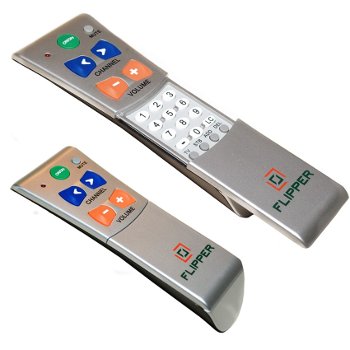
This remote control works both your TV and your set-top box or satellite channels, and is the only remote aimed at seniors which is also designed to be compatible with digital technology. When closed, the remote shows only on/off, volume, and channel change buttons: when flipped open, you get a full set of buttons to program the remote.
It’s possible to lock the remote closed, so your loved one won’t accidentally reprogram the TV while they’re trying to watch the news. There’s an optional favorite channel setting, which allows you to pre-program up to 30 channels to reduce overload.
5. Large print calender
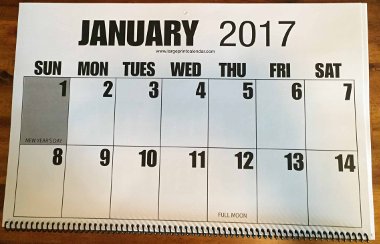
People in the early stages of Alzheimer’s often struggle to keep track of dates and appointments. This calendar has extra-large print, no confusing miscellaneous facts, and loads of space for writing appointments. Hang it on the wall in an easy-to-see place to help to keep track of important dates.
6. Gps tracking for dementia patients
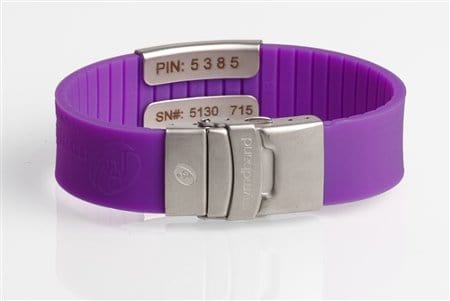
People with Alzheimer’s often find themselves getting lost even in familiar places. Some people wander off without warning, which is dangerous for them and scary for their caregivers. GPS tracking is one way to make sure your loved one can always be found if they get lost.
There are a range of different GPS trackers on the market, and different ones might be suitable for different people. These location devices come in bracelets, watches, pocket finders, and tags. You can even put GPS tracking into a pair of shoes.
GPS trackers vary a lot. Some are linked to an app or a website, so you can find the tracker on a map – ideal if you want the reassurance of glancing at a screen and knowing Dad is safely at home. Others come with inbuilt support, so that if your loved one gets lost someone will be sent out to find them – which is great if you live far away, or work long hours. Some provide scannable QR codes, so that if a person is found wandering, their emergency contact information can be quickly downloaded.
7. Brain train games
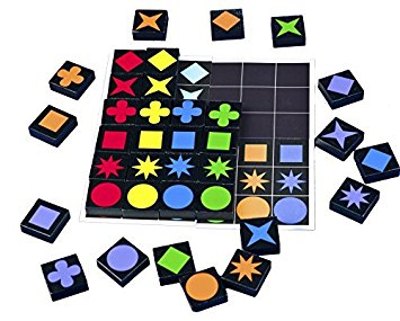
Brain training games help to keep the mind active, and provide a sense of achievement. Word searches, Sudoku, and crosswords are all popular with people in the early stages of Alzheimer’s, as they can be done in short bursts and picked up again after a break. If your loved one is in the middle stages of the disease, treat them to a specially designed game for people with memory loss.
These are simple enough to follow for patients with reduced capacity, but they’re designed for adults and aren’t childish-looking.
Match the Shapes is a straightforward task of sorting shapes onto a grid. The tiles come pre-sorted into four bags: you start with one bag of tiles and one grid, then add another bag and another grid to make it more challenging. Even if a person can’t follow the templates, the sturdy and colorful plastic tiles are fun to stack and sort.
Match the Suits is a similar activity with large-index playing cards. You can sort the cards by suit or color, and for passionate card players there’s a poker hands matching activity included. The game comes with full instructions on how to set it up so the person playing enjoys it and feels a sense of accomplishment.
8. Picture phone
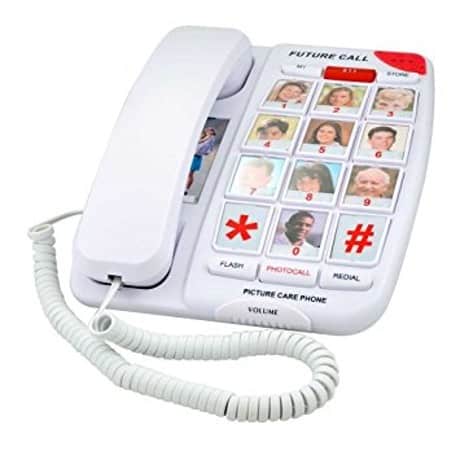
Instead of numerical buttons, this picture dial phone can be pre-programmed to call up to 9 different people. Stick a photo under each button and your loved one can call by pressing the person they want to talk to, rather than dialing a ten-digit number.
You can also put in a hand-written label if that’s easier to read. The phone needs to be set up by a caregiver but once it’s working then it’s easy to use.
There’s also a 911 button to use in case of emergencies. This can be reprogrammed to call a different number if you’re worried about accidental calls.
9. Reminder pillbox
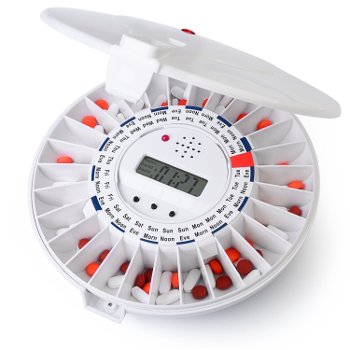
Keeping track of time is difficult for Alzheimer’s patients, which can lead to accidentally missing or double-dosing medications. This timed pillbox sounds a chime and automatically dispenses medication at a pre-set time. There are 28 roomy compartments, and you can set up to 6 different alerts per day.
If a patient misses a dose, it will get sucked back into the dispenser when the next lot of medication comes out, so caregivers can look into the compartment and see which doses have been missed.
The pillbox has a locking front, so there’s no risk of accidentally knocking it open, or taking a dose from the wrong day like a traditional days-of-the-week pillbox. The timer is easy for a caregiver to program, and it saves having to make constant “have you taken your meds?” phone calls.
10. Talking photo album
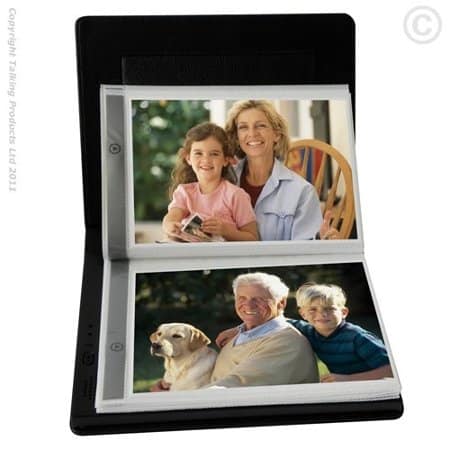
People with early and mid-stage Alzheimer’s usually find that their early memories are intact but their recent memories are starting to blur. This 20-image talking photo album lets you record up to 200 minutes of speech with its inbuilt microphone, and it can be re-recorded indefinitely.
Fill it with photos from your loved one’s youth and let them record their reminiscences for you; or if you don’t live close enough to see them regularly, put in pictures of your life and tell them your news through the recording. For people who are starting to struggle to recognize those they know, put together photos of their family with a description of how they know each other.
It can also double up as an instruction manual for someone who is living independently but sometimes has trouble remembering how to use the microwave or dishwasher: just put in a photo of the appliance and record some instructions.
For Alzheimers caregivers
11. Journal for caregivers
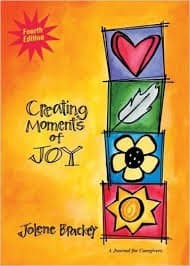
Being a caregiver for someone with Alzheimer’s is one of the toughest things you could ever do, and it’s easy to get caught up in the day-to-day grind without ever seeing the bigger picture.
This warmly-written book teaches caregivers how to get into the mind of a person with advanced Alzheimer’s, and how to focus on creating brief snatches of happiness amongst the confusion and fear of the disease. People with severe dementia live from moment to moment, and this book tells you how to make perfect moments for them.
12. Family guide for caregivers
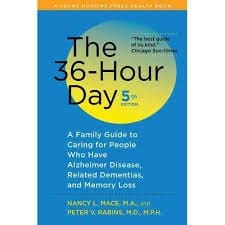
When someone you know is diagnosed with Alzheimer’s, it can be hard to know what to do. This book walks you through every stage of the disease, from comforting someone who’s just been diagnosed to finding live-in care for a person in the late stages of the disease.
It covers all the symptoms of the disease, from simple medical problems like dizziness and confusion, to complex issues like the mood swings and paranoia that often affect people with Alzheimer’s. In addition, it covers a myriad of things you may not have considered before, like the financial and legal issues you must address in order to take care of someone
Last Updated on January 31, 2017 by Tyler

